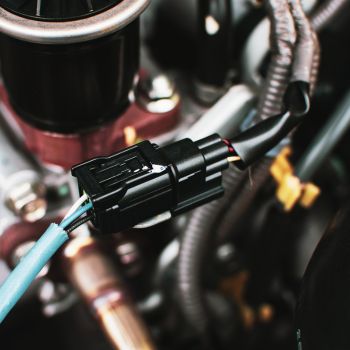 Today, sensors throughout your vehicle monitor everything from oil levels to tire pressure and other key performance metrics, sending this data to the Onboard Diagnostic Computer (OBD-II) located in the engine control module (ECM).
Today, sensors throughout your vehicle monitor everything from oil levels to tire pressure and other key performance metrics, sending this data to the Onboard Diagnostic Computer (OBD-II) located in the engine control module (ECM).
Like any other part of your car, sensors are not immune to wear and tear. Over time, dirt, damage, or electrical problems can interfere with their ability to collect accurate readings. When a sensor starts to fail, it can affect the overall performance of your vehicle. Understanding how these sensors work and what to watch for can help you avoid bigger issues down the road.
How Car Sensors Work
The Engine Control Module (ECM) has become a core component of modern vehicles since the 1980s. Working in tandem with the OBD-II system, the ECM gathers and interprets data from various sensors, using that information to optimize your car’s performance, fuel efficiency, and emissions. Some of the most important sensors include:
- Oxygen Sensor: This sensor measures the amount of oxygen in the exhaust gases after combustion. It sends this data to the Powertrain Control Module (PCM), which then adjusts the air-to-fuel ratio to keep emissions low. A faulty oxygen sensor can lead to poor fuel economy, rough idling, or even engine misfires.
- Wheel Speed Sensors: These sensors are crucial for the Anti-lock Braking System (ABS), helping to prevent wheel lockup during sudden stops.
- Mass Airflow Sensor: This sensor measures the volume of air entering the engine, allowing the ECM to adjust fuel injection and ignition timing accordingly.
- Manifold Absolute Pressure Sensor: Monitors the pressure inside the intake manifold, helping the ECM determine the correct fuel delivery.
- Fluid Level Sensor: Tracks oil, coolant, and other essential fluids, alerting you when levels drop below safe thresholds.
- Tire Pressure Sensors: Monitor tire pressure in real-time, warning you if one or more tires are under-inflated.
Common Sensor Issues and Signs
As your car ages, sensors can become clogged with debris, exposed to harsh chemicals, or suffer from electrical faults. These issues can cause inaccurate readings, leading to a range of problems. In some cases, the sensor might stop working altogether, causing serious performance issues.
Here are some common signs that a sensor may be malfunctioning:
- The Check Engine Light is on. This is often the first sign that something is wrong, though it could indicate a variety of issues, including sensor failure.
- Decreased fuel efficiency. If your car is burning more gas than usual, it could be due to a faulty sensor affecting the air-to-fuel ratio.
- Engine hesitation or misfiring. Inaccurate sensor data can disrupt the combustion process, leading to rough idling or stalling.
- Overheating or unusual noises. A failing sensor might not detect rising temperatures, leading to potential engine damage.
If you're noticing any of these symptoms but can't pinpoint the cause, it's time to get your car checked by a professional. At DaSilva’s Auto Body, our technicians use advanced diagnostic tools to test your sensors, ECM, and other systems to identify the root issue. Don’t ignore the signs — early detection can save you time, money, and headaches in the long run. Contact us today for a full inspection and expert advice!
Entry Level Euphonium,Bb Flat Euphonium,Compensation Euphonium,Brass Instrument Euphonium
ZhengOu Musical Instruments Co.,LTD , https://www.zomusical.com